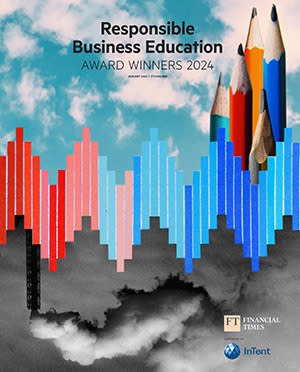Business schools pushed to provide a more responsible education

Roula Khalaf, Editor of the FT, selects her favourite stories in this weekly newsletter.
Bruce Usher has been teaching a climate course at Columbia Business School for almost 15 years, but has seen a sharp escalation in interest in the past three. “It’s being driven by a recognition that business now has a central role in addressing the climate crisis,” he says.
At the COP28 summit last month, he was among professors from nearly 20 business schools in the US and beyond who pooled their resource to create an Open Climate Curriculum. Their work complements the launch of free online lectures and materials in 2021 by eight European schools, and another more recent project to share insights from schools in the Middle East.
Such efforts reflect intensifying demands from students, faculty, employers and society at large for more responsible business education, on pressing topics such as climate change and inequality.
Abigail Herron, global head of strategic ESG partnerships at Aviva Investors and one of the FT Responsible Business Education award judges this year, says recruiters want business school graduates equipped to promote “the sustainability of the financial system, the real economy and the society and environment on which they depend”.
Against a backdrop of rising demand for business courses, business schools play an outsized role in academia through their teaching, research and broader operations. They are pivotal in providing training and generating insights for the next generation of entrepreneurs, managers, executives, investors, regulators, and other decision makers who will shape the future of the planet.

Increasingly, governments and other funders of academic institutions are, themselves, urging a greater focus on universities’ societal impact — for example, through the UK’s Research Excellence Framework and equivalents in jurisdictions as diverse as France, Australia, Hong Kong and Canada.
Business school accreditation agencies — including the AACSB, Equis and AMBA — are all stressing societal impact and responsibility in their frameworks, reporting systems and events. The Responsible Research in Business and Management network and the UN’s Principles for Responsible Management Education are also pushing for greater focus on action.
Tools such as the Sulitest questionnaire, which assesses climate understanding, seek to benchmark knowledge and track students’ progress at different schools. As we describe in this report, machine learning and digital technology can help analyse academic research and course content to track the focus on sustainability.
The FT’s own rankings seek to measure business schools’ progress, rewarding the extent to which they integrate ESG themes into their core courses; progress towards net zero targets for carbon emissions on their own campuses; and carry out comprehensive carbon audits.
But there are limits to which quantification and metrics alone can fully measure the variety of innovation and impact under way. The FT’s awards, now in their third year, seek to fill that gap: to identify, highlight and incentivise examples of best practice, as assessed by a distinguished panel of judges from different countries, sectors and backgrounds.
In this report, we have followed up on some of the previous winners to find examples of projects that have since accelerated, at least partly as a result of the attention they received through the awards. The publicity can trigger unexpected pressures, and expansion is not easy. But we hope recognition motivates the innovators and backers, and provides inspiration and models for replication by others.
Each year, the award categories evolve as we seek to capture different actions around responsible business education. To encourage co-operation, showcase the variety of projects that exist, and reflect the complexity of assessing competing ideas, we do not identify a single “champion”. Instead, our judges selected five winners and a dozen highly commended entries for each award.
One award in each year, so far, has concerned a basic function of business schools: rigorous academic research. It seeks to recognise work with societal impact, demonstrated through evidence of changing policy or practice.
The selection is impressive, including an analysis of the costs of US politically inspired “anti-ESG” investment bans, the neglect by business of marine ecosystems, and the exposure of hype around corporate climate pledges. Other work has helped mitigate vigilantism and violence against women.
The winners and the highly commended researchers deployed approaches from ethnography to machine learning, and most worked in interdisciplinary teams, some with colleagues from other universities and non-academic institutions.
What distinguished them was a determination to engage with practitioners in the design, research and dissemination of their work to bring about change. Sadly, that was infrequent in other submissions and is widespread in broader academic practice.
All too often, the culture of academia — constrained and compounded by existing incentives for hiring, promotion, tenure and recognition — concentrates instead on the narrowly defined, inward-looking “impact” as measured by publication in a prestigious peer-reviewed journal. These papers may advance intellectual knowledge, but are read by few and have scant influence on the world of practice.
“Business schools have lost their way,” says Prof Andy Hoffman from the University of Michigan. “Research is elevated over teaching, and research that privileges theory over practice is prioritised. We find ourselves talking to smaller and narrower academic audiences, using a language that even well-educated readers do not understand, publishing in journals they don’t read, and asking questions for which they have little concern.”
Our second award category is for teaching — arguably the academic activity with the greatest impact. The criteria were narrower than last year’s in scope, with particular concentration on the core discipline of finance. The formats assessed were broader than simply teaching cases, which are evolving to encompass sustainability but which many schools argue require revamping or replacing.
Instead, some of the most impressive entries this year were modules, courses, textbooks and experiential learning through projects, simulations and even virtual reality. They were offered in undergraduate and masters programmes, but also targeted a far wider audience: from secondary school students to doctoral candidates and executives. They explored poverty, entrepreneurship and the intellectual foundations of finance.
A number were produced in partnership with different institutions, and with third parties such as the UN and the World Business Council for Sustainable Development. One impressive executive education initiative, the Climate Solutions Partnership between Strathclyde University and the Royal Scottish Geographical Society, was only excluded because it was launched too long ago to be eligible, given the award’s focus on recent pedagogical innovations.
Stephen Sammut, one of the award judges, who is both a lecturer at Wharton Business School and chairs the advisory board of a private equity group, argues for greater bridge-building between research and practice. “In many cases, the students do not fully appreciate the forces and foundations behind their learning,” he says. “Consequently, they graduate from MBA programmes without a full appreciation of the research process and its importance in discerning truth.”
He says professors should cite their own work more often and explicitly in class. And students should develop the habit of reading more academic research and, on completion of their courses, continue to engage with their teachers to stay up to date and to help nurture useful research projects.
The final category in this year’s awards sought, for the first time, to measure the best overall schools for responsible business education. Many institutions can point to individual electives, professorships, institutes, student projects or campus policies. Far fewer are integrating the theme systematically or developing measures to track progress and hold themselves to account.
Even for leadership teams that are committed, deciding where to focus and developing meaningful metrics is not easy — even before taking into account the conflicting pressures and varied level of interest from students, employers and society more broadly.
The winners demonstrated impressive actions, including one school that has introduced compulsory training in sustainability — not only for students but also for faculty and staff. Others emphasised social impact and consulting projects for students; the use of personal carbon budgets; and frequent consultation and engagement to hold their institutions accountable.
Overall, the awards highlight a set of challenges. For business schools, there is a need to shift incentives to stimulate more research and teaching of responsible business practices, develop better measures of impact and encourage greater sharing of their actions.
For employers, there is still a substantial disconnect between the rhetoric of top executives who argue in favour of sustainability and the recruitment and training policies to reflect those skills and values. Most continue to gravitate to the “usual suspects” among business schools for insights and employees.
One business network, the B Team, is now reflecting on the issue. “MBA recruits will engage with sustainability topics in meeting rooms every day, so ESG needs to be a core competency of graduates,” says Hiro Mizuno, a participant who is former chief investment officer of Japan’s Government Pension Investment Fund. “Corporate recruiters need to update their approach, inquiring about qualifications that include ESG analytical skills and a sustainability mindset.”
The FT will continue to explore ways to evolve its awards, rankings and reporting around responsible business education. This year’s winners reflected a geographical mix across Europe, the US, Canada and Australia, and some strong entries from Mexico, Peru and Lebanon. But suggestions on new approaches to track progress and encourage more diverse entries are welcome.
Congratulations to the winners, many thanks to all the schools that made submissions, and above all to our group of experienced judges for their assessments.
The judges
The Financial Times appointed a panel of external judges to determine the winners of this year’s Responsible Business Education awards. They assessed the work of leading academics and institutions for their positive effect on society and commitment to a responsible ethos
Richard Barker
Board member, International Sustainability Standards BoardLily Bi
President and CEO, AACSB InternationalBrian Bruce
Editor, Journal of Impact and ESG InvestingLaurent Choain
Leadership, education and culture chief, Mazars GroupJean-Christophe Carteron
President, SulitestEric Cornuel
President, EFMD GlobalBernard David
Chair, Advisory Board, Global CO2 InitiativeAnila DeHart
Global talent managing director, DeloitteGeorges Dyer
Executive director, Intentional Endowments NetworkJavier Espinosa
EU correspondent, Financial TimesRichard Fernand
Head, certificates, CFA InstituteJohn Goodwin
Executive chairman, Learning Economy Foundation; special adviser, PRME, an initiative of the United Nations Global CompactToure Hafou
Founder, HTS PartnersAbigail Herron
Global head of strategic ESG partnerships, Aviva InvestorsAndre Hoffman
Co-chair, InTent; vice-chair, RocheAndrew Jack
Global education editor, Financial TimesKaren Johns
CEO, Net ImpactAndrew Karolyi
Chair, Responsible Research in Business and Management; Dean, Cornell SC Johnson College of BusinessMegan Kashner
Professor, director of social impact and sustainability, Northwestern UniversityGorgi Krlev
Associate professor, ESCPDan LeClair
CEO, Global Business School NetworkCarolin Lemke
Co-president, Oikos InternationalVicky Lester
CEO, The Case CentreKaty Mason
Professor, Lancaster University; president, British Academy of ManagementDarija Miletic
Co-president, Oikos InternationalJohn Norris
Policy adviser, Bill & Melinda Gates FoundationJohn North
Executive director, Globally Responsible Leadership InitiativeAustin Okere
Founder, CWGDave Reibstein
Professor, Wharton School; co-founder, Responsible Research in Business and ManagementJérôme Rive
Executive director, European Institute for Advanced Management StudiesOliver Rothschild
Managing director, DRK FoundationStephen Sammut
Chair, Industry Advisory Board, Alta Semper CapitalHelen Slinger
Executive director, Accounting for SustainabilitySuzanne Smetana
Managing director, sustainability, climate and equity, DeloitteJeanne Stampe
Specialist leader, Monetary Authority of SingaporeMeredith Storey
Senior manager at PRME, an initiative of the United Nations Global CompactKarthik Venkataraman
Partner, Bain & CoHazel Walker
External relations manager, The Case CentreGiselle Weybrecht
Author, ‘The Sustainable MBA’

Comments